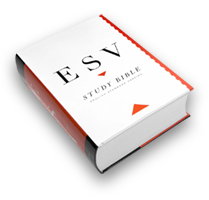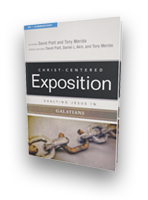Buy an ESV Study Bible
Buying an ESV Study Bible will be helpful because:
- The ESV (English Standard Version) is one of the most accurate word-for-word translations available.
- Study Bibles contain the Bible as well as helpful study tools (historical context, word studies, and more).
Here is one ESV Study Bible you can consider.
Use Commentaries
Commentaries are helpful because:
- Many of them are written by scholars or pastors with understanding of the historical and biblical context of the book on which they are writing and they also typically know the original language, making grammatical study possible in the original biblical languages, Hebrew and Greek.
- Helpful commentaries are available for all stages of spiritual growth. There are commentaries that focus on life application and others written for scholars. Regardless where you are at, there is a commentary that can help you learn and grow.
Here is a commentary series you can consider.
The Bible Project is helpful because they offer free tools that will help you:
- Study the Bible book by book.
- Study the Bible thematically, examing the themes that occur acorss both the Old and New Testaments.
- Study the Bible using reading plans, exegetical tools, and more.
Click here to visit the Bible Project’s webiste.
Logos is a comprehensive Bible study software that will allow you to:
- Dig into the original languages, using word studys, lexicons, and more.
- Purchase your own library of extra curriculur study materials like digital commentaries, disctionaries, encyclopedias, devotionals, and more.
- Study the Bible using reading plans, exegetical tools, and more.
- Quickly cross reference passages of Scripture with all related content throughout the Bible.
Click here to learn about Logos.
Avoid this question…
What does this passage mean to me?
The goal of interpretation is not to apply your own meaning to the text.
That’s called eisegesis and it must be strictly avoided.
Eisegesis (“ice-eh-jee-sis”): Interpretaiton based on your own presuppositions, perosnal bias, or agenda.
Instead, ask this quesiton…
What does the original author mean?
The goal of interpretation is to understand the author’s intent.
Remember, for every passage of Sciprutre, there is both:
- A divine author: the God of the universe who spoke the universe (Genesis 1:1) and His Word (2 Timothy 3:16-17) into existence.
- A human author: the person God chose to produce the text and pass it along to others on His behalf. God uses each author’s unique life and context and chooses to speak through each human author’s unique intellect.
Also ask…
How did the original author intend the original audience to undersatnd the passage?
The human authors did not have you in mind when they wrote their books. They were writing to their intended audience.
Remember, the audience may be:
- Jewish
- Gentile
- the citizens of a certain city
- a persecuted audience
- a specific person
- a general audience
Once you understand the author’s meaning for the original audience, it’s time to…
Build a bridge from the original context to your context, through the cross.

Ask God how the cross changes where you stand in relation to the original context of the passage.
Remember, if you’re stuck interpreting a passage, you can always:
- check reputable online sources
- ask a church elder for guidance
In Your Mind
Begin by preaching the Word to yourself, that you will contiually be “renewed by the transformation of your mind.” (Romans 12:2)
Begin by:
- Studying the Bible every day
- Memorizing Scripture
- Placing scripture (post-its, artwork, literature) around your home that helps you recall God’s Word
In Your Conversations
Allow your conversations to be shaped by what you learn from the Word, that you may teach those you’re closest to (Deuteronomy 6:7).
- Ask God to reshape all your philosophical and/or political views to align the things you say with Scripture
- Explicitly speak the truths of Scripture to others
In a Small Group
Welcome the Word of God to become the binding agent between you and others, as you seek to live in biblical, Word-based community (Colossians 3:16).
- Join a life group and study the Bible with others
- Ensure that your conversations with your community are driven by your biblical beliefs
- Use the Word to encourage and gentley admonish others when necessary
Click here to join a life group.
In Ministry
Ask God to show you how He wants you to use the Word to teach and minister to others.
- Take a spiritual gifts assessment by clicking here.
- Ask an Elder how you can get involved in Word-based ministries
More Helpful Definitions of Expository Preaching
“Expository preaching is the communication of a biblical concept, derived from and transmitted through a historical, grammatical, and literary study of a passage in its context, which the Holy Spirit first applies to the personality and experience of the preacher, then through the preacher, applies to the hearers.” Haddon Robinson, Biblical Preaching: The Development and Delivery of Expository Messages (Grand Rapids, MI: Baker Books, 1980), 21.
“Exposition refers to the content of the sermon (biblical truth) rather than its style (a running commentary). To expound Scripture is to bring out of the text what is there and expose it to view. The expositor opens what appears to be closed, makes plain what is obscure, unravels what is knotted, and unfolds what is tightly packed.” John Stott, Between Two Worlds (Grand Rapids, MI: William B. Eerdmans Publishing Company, 1982), 92.
“The first and foundational criterion is that sermons must be biblical, that is, they must pass on the meaning and intent of Scripture. A second criterion, implied in the first, is that sermons must be God-centered (or Christ-centered) rather than human centered. If the Bible can indeed be characterized as God’s self-revelation, then any biblical sermon will have to manifest that same quality by being God-centered and not human-centered. A third criterion is that sermons must be good news. If one of the main New Testament words for preaching is ‘to announce good news’ (euangelizomai), and if one may characterize as ‘good news’ not only the Gospels but the entire Bible, then our sermons ought also to measure up to this standard so that they are indeed good news.” Sidney Greidanus, The Modern Preacher and the Ancient Text: Interpreting and Preaching Biblical Literature (Grand Rapids: Eerdman’s Publishing Co., 1988), 15.
Expository preaching is “unfolding the text of Scripture in such a way that makes contact with the listener’s world while exalting Christ and confronting them with the need for action.” Alistair Begg, Preaching for God’s Glory (Wheaton, IL: Crossway Books, 1999), 23.
“Expository preaching is the contemporization of central proposition of a biblical text that is derived from proper methods of interpretation and declared through effective means of communication to inform minds, instruct hearts, and influence behavior toward godliness.” Ramesh Richard, Preparing Expository Sermons: A Seven-Step Method for Biblical Preaching (Grand Rapids, MI: Baker Books, 2001), 19.
“The main idea of an expository sermon (the topic), the divisions of that idea (the main points), and the development of those divisions (the subpoints), all come from truths the text itself contains. No significant portions of the text is ignored. In other words, expositors willingly stay within the boundaries of the text (and its relevant context) and do not leave until they have surveyed its entirety with their listeners.” Bryan Chapell, Christ-Centered Preaching (Grand Rapids, MI: Baker Publishing Group, 2005), 131.
“Expository preaching is text driven preaching that honors the truth of Scripture as it was given by the Holy Spirit. Its goal is to discover the God-inspired meaning through historical-grammatical-theological investigation and interpretation. By means of engaging and compelling proclamation, the preacher explains, illustrates and applies the meaning of the biblical text in submission to and in the power of the Holy Spirit, preaching Christ for a verdict of changed lives.” Daniel Akin, Bill Curtis, Stephen Rummage, Engaging Exposition (Nashville, TN: B&H Academic, 2011), 2.
We are here to help you learn how to study the bible. If we can answer questions or further assist you, email us at info@gracepointestcloud.com.









